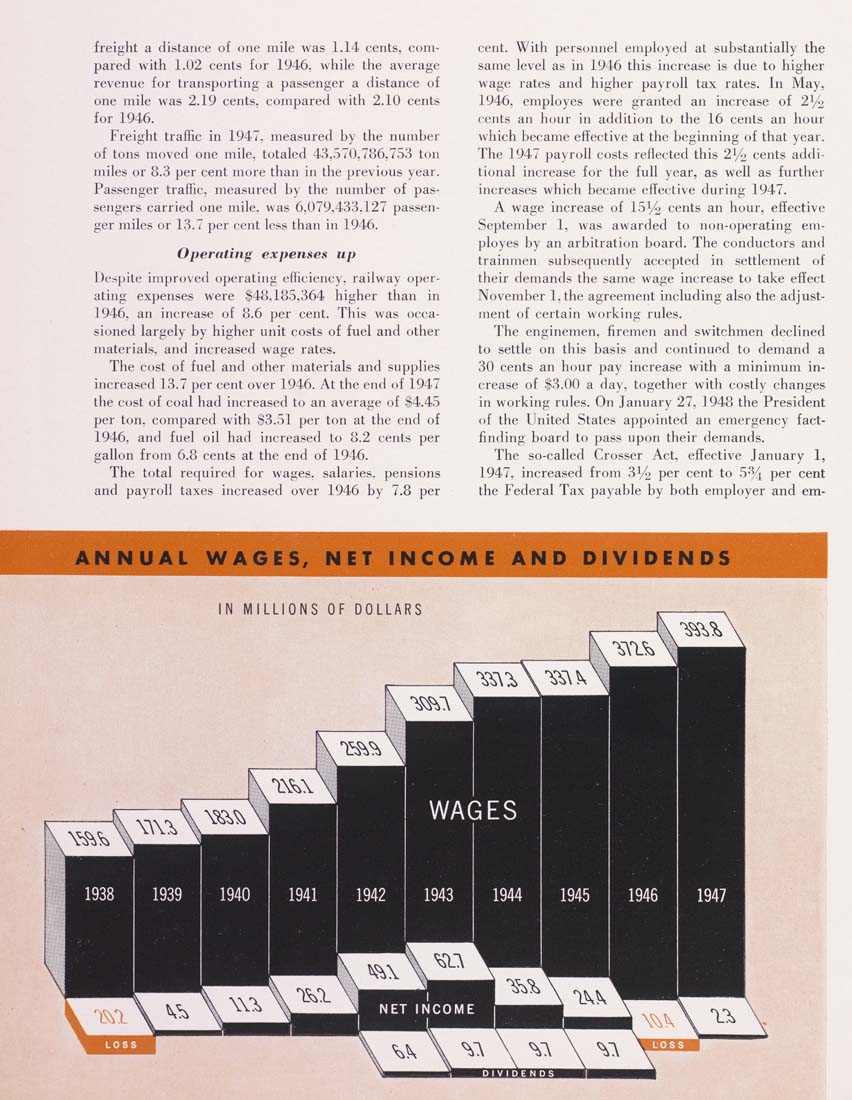freight a distance of one mile was 1.14 cents, com¬
pared with 1.02 cents for 1946, while the average
revenue for transporting a passenger a distance of
one mile was 2.19 cents, compared with 2.10 cents
for 1946.
Freight traffic in 1947, measured by the number
of tons moved one mile, totaled 43,570,786,753 ton
miles or 8.3 per cent more than in the previous year.
Passenger traffic, measured by the number of pas¬
sengers carried one mile, was 6,079,433,127 passen¬
ger miles or 13.7 per cent less than in 1946.
Operating expenses up
Despite improved operating efficiency, railway oper¬
ating expenses were $48,185,364 higher than in
1946, an increase of 8.6 per cent. This was occa¬
sioned largely by higher unit costs of fuel and other
materials, and increased wage rates.
The cost of fuel and other materials and supplies
increased 13.7 per cent over 1946. At the end of 1947
the cost of coal had increased to an average of $4.45
per ton, compared with $3.51 per ton at the end of
1946, and fuel oil had increased to 8.2 cents per
gallon from 6.8 cents at the end of 1946.
The total required for wages, salaries, pensions
and payroll taxes increased over 1946 by 7.8 per
cent. With personnel employed at substantially the
same level as in 1946 this increase is due to higher
wage rates and higher payroll tax rates. In May,
1946, employes were granted an increase of 2%
cents an hour in addition to the 16 cents an hour
which became effective at the beginning of that year.
The 1947 payroll costs reflected this 2^ cents addi¬
tional increase for the full year, as well as further
increases which became effective during 1947.
A wage increase of 15% cents an hour, effective
September 1, was awarded to non-operating em¬
ployes by an arbitration board. The conductors and
trainmen subsequently accepted in settlement of
their demands the same wage increase to take effect
November l,the agreement including also the adjust¬
ment of certain working rules.
The enginemen, firemen and switchmen declined
to settle on this basis and continued to demand a
30 cents an hour pay increase with a minimum in¬
crease of $3.00 a day, together with costly changes
in working rules. On January 27, 1948 the President
of the United States appointed an emergency fact¬
finding board to pass upon their demands.
The so-called Crosser Act, effective January 1,
1947, increased from 3% per cent to 5% per cent
the Federal Tax payable by both employer and em-
w
ANNUAL WAG||J^|jyyyNCOMy^AND DIVIDE N
IN MILLIONS OF DOLLARS
|








